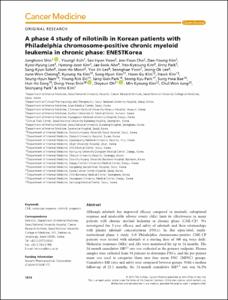KUMEL Repository
1. Journal Papers (연구논문)
1. School of Medicine (의과대학)
Dept. of Internal Medicine (내과학)
A phase 4 study of nilotinib in Korean patients with Philadelphia chromosome-positive chronic myeloid leukemia in chronic phase: ENESTKorea
- Keimyung Author(s)
- Do, Young Rok
- Department
- Dept. of Internal Medicine (내과학)
- Journal Title
- Cancer Medicine
- Issued Date
- 2018
- Volume
- 7
- Issue
- 5
- Keyword
- CML; nilotinib; prognosis; molecular response
- Abstract
- Although nilotinib has improved efficacy compared to imatinib, suboptimal response and intolerable adverse events (AEs) limit its effectiveness in many patients with chronic myeloid leukemia in chronic phase (CML-CP). We investigated the 2-year efficacy and safety of nilotinib and their relationships with plasma nilotinib concentrations (PNCs). In this open-label, multi-institutional phase 4 study, 110 Philadelphia chromosome-positive CML-CP patients were treated with nilotinib at a starting dose of 300 mg twice daily. Molecular responses (MRs) and AEs were monitored for up to 24 months. The 24-month cumulative MR4.5 rate was evaluated as the primary endpoint. Plasma samples were collected from 94 patients to determine PNCs, and the per-patient mean was used to categorize them into four mean PNC (MPNC) groups. Cumulative MR rates and safety were compared between groups. With a median follow-up of 22.2 months, the 24-month cumulative MR4.5 rate was 56.2% (95% confidence interval, 44.0%-8.3%), and the median time to MR4.5 was 23.3 months. There were no significant differences in the cumulative rates of major molecular response, MR4 , and MR4.5 between MPNC groups. One patient died due to acute viral hepatitis, and two developed hematological or cytogenetic relapse, while no progression to accelerated or blast phase was observed. Safety results were consistent with previous studies with no new safety signal identified. Across the MPNC groups, there was no significant linear trend in the frequency of AEs. Nilotinib is highly effective for the treatment of CML-CP with manageable AEs. The measurement of PNC has no predictive value for patient outcomes and is thus not found to be clinically useful. This study is registered with clinicaltrials.gov, Number NCT03332511.
- Keimyung Author(s)(Kor)
- 도영록
- Publisher
- School of Medicine (의과대학)
- Citation
- Junghoon Shin et al. (2018). A phase 4 study of nilotinib in Korean patients with Philadelphia chromosome-positive chronic myeloid leukemia in chronic phase: ENESTKorea. Cancer Medicine, 7(5), 1814–1823. doi: 10.1002/cam4.1450
- Type
- Article
- ISSN
- 2045-7634
- Appears in Collections:
- 1. School of Medicine (의과대학) > Dept. of Internal Medicine (내과학)
- 파일 목록
-
-
Download
 oak-2018-0050.pdf
기타 데이터 / 320 kB / Adobe PDF
oak-2018-0050.pdf
기타 데이터 / 320 kB / Adobe PDF
-
Items in Repository are protected by copyright, with all rights reserved, unless otherwise indicated.